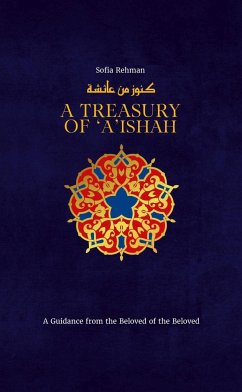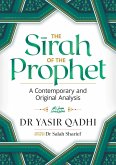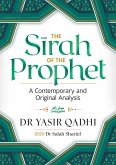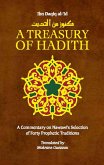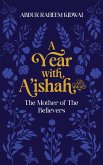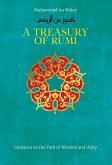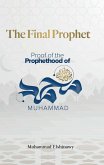18,99 €
inkl. MwSt.
Versandfertig in 2-4 Wochen

9 °P sammeln
- Gebundenes Buch
- Merkliste
- Auf die Merkliste
- Bewerten Bewerten
- Teilen
- Produkt teilen
- Produkterinnerung
- Produkterinnerung
An introduction to one of the most admired women in Islamic history with accompanying commentaries, presented in a beautiful gift format.
Andere Kunden interessierten sich auch für
![The Sirah of the Prophet (Pbuh) The Sirah of the Prophet (Pbuh)]() Yasir QadhiThe Sirah of the Prophet (Pbuh)30,99 €
Yasir QadhiThe Sirah of the Prophet (Pbuh)30,99 €![The Sirah of the Prophet (Pbuh) The Sirah of the Prophet (Pbuh)]() Yasir QadhiThe Sirah of the Prophet (Pbuh)44,99 €
Yasir QadhiThe Sirah of the Prophet (Pbuh)44,99 €![A Treasury of Hadith A Treasury of Hadith]() Shaykh al-Islam Ibn Daqiq al-'IdA Treasury of Hadith12,99 €
Shaykh al-Islam Ibn Daqiq al-'IdA Treasury of Hadith12,99 €![A Year with A'Ishah (Ra) A Year with A'Ishah (Ra)]() Abdur Raheem KidwaiA Year with A'Ishah (Ra)14,99 €
Abdur Raheem KidwaiA Year with A'Ishah (Ra)14,99 €![A Treasury of Rumi A Treasury of Rumi]() Muhammad Isa WaleyA Treasury of Rumi18,99 €
Muhammad Isa WaleyA Treasury of Rumi18,99 €![The Final Prophet The Final Prophet]() Mohammad ElshinawyThe Final Prophet18,99 €
Mohammad ElshinawyThe Final Prophet18,99 €![A Life with the Divine A Life with the Divine]() Ali HammudaA Life with the Divine27,99 €
Ali HammudaA Life with the Divine27,99 €-
-
-
An introduction to one of the most admired women in Islamic history with accompanying commentaries, presented in a beautiful gift format.
Produktdetails
- Produktdetails
- Treasury in Islamic Thought and Civilization
- Verlag: Kube Publishing Ltd
- Seitenzahl: 192
- Erscheinungstermin: 25. April 2023
- Englisch
- Abmessung: 179mm x 115mm x 15mm
- Gewicht: 202g
- ISBN-13: 9781847742018
- ISBN-10: 1847742017
- Artikelnr.: 64541621
- Herstellerkennzeichnung
- Libri GmbH
- Europaallee 1
- 36244 Bad Hersfeld
- gpsr@libri.de
- Treasury in Islamic Thought and Civilization
- Verlag: Kube Publishing Ltd
- Seitenzahl: 192
- Erscheinungstermin: 25. April 2023
- Englisch
- Abmessung: 179mm x 115mm x 15mm
- Gewicht: 202g
- ISBN-13: 9781847742018
- ISBN-10: 1847742017
- Artikelnr.: 64541621
- Herstellerkennzeichnung
- Libri GmbH
- Europaallee 1
- 36244 Bad Hersfeld
- gpsr@libri.de
Dr Sofia Rehman is an independent scholar of Islam trained both traditionally in Syria, Tukey and Wales, and through academia whose PhD focused on the statements of Aisha Bint Abi Bakr as recorded in the work of the 14th century scholar, Imam al-Zarkashi. Her book based on this thesis is entitled, Gendering the Hadith Tradition: Recentering the Authority of Aisha, Mother of the Believers (Oxford University Press). She is a committed advocate of bridging the gap between academic scholarship on Islam and the wider Muslim community, setting up critical reading groups and workshops with global reach to facilitate learning, curiosity and spiritual empowerment. She has also contributed to a number of anthologies including Cut From the Same Cloth? Muslim Women on Life in Britain edited by Sabeena Akhtar (Unbound), Mapping Faith: Theologies of Migration edited by Lia Shimada (Jessica Kingsley), and Violent Phenomena: 21 Essays on Translation edited by Kavita Bhanot and Jeremy Tiang (Tilted Axis).
Table of Contents
Introduction
6
Tafsīr of ʿAisha bint Abu
Bakr
9
The power of duʿāʾ and the nearness of Allah to the
believer 9
Every hardship or suffering is an expiation for the
believer 11
Do not use Allah as an excuse to refrain from good
deeds 12
Finding strength in the Creator over the
Creation 14
The importance of the pursuit of justice in the life of
Muslims 15
Supplicating to Allah to keep our hearts firm upon
faith 17
Fiqh of
ʿAisha
19
Women’s
travel
19
On the need to unravel braids for
ghusl 20
On perfume while in a state of
Iḥrām 21
When a woman starts her period while she is performing the
Hajj 21
The status of a child born out of
wedlock 22
On the need to perform wudhu after performing ghusl on the
Deceased 24
Whether a woman nullifies the
prayer 25
On Salat al-Duha
26
On when to break
fast
28
On ostentatious
living
28
ʿAisha on matters of Aqidah
31
Women as a source of bad
luck
31
Punishment of the believers in the
hereafter 32
Whoever loves to meet Allah, Allah loves to meet
them 33
The Prophet’s ascension to
Allah
34
ʿAisha’s political influence: her Siyāsah Sharʿiyya
36
Her commitment to the
Sunnah
37
ʿAisha’s speech upon hearing of ʿUthman’s
murder 37
ʿAisha’s letter of appeal to the
Kuffans 39
Etiquette of
war
40
The poetry of ʿAisha and her
army
41
ʿAisha’s warning to
Muʿāwiyyah
42
ʿAisha on heart
softeners
44
The Prophet would choose the easiest of what is
permissible 44
The Prophet loved to show gratitude to
Allah 46
Mercy begins at
home
47
The rights of a
neighbour
49
The perfect character of the
Prophet
50
On controlling the
tongue
51
On
gentleness
53
Humility
55
Abu Bakr on his
deathbed
57
The ideal duʿāʾ
58
The reward for reciting the
Qur’an
59
The blessed character of the Prophet
(SAW) 60
The Prophet’s duʿāʾ for his
ummah 62
At the first sign of hardship the believer’s refuge is in
Allah 64
Bibliography
69
Arabic
references
69
English
references
70
Introduction
6
Tafsīr of ʿAisha bint Abu
Bakr
9
The power of duʿāʾ and the nearness of Allah to the
believer 9
Every hardship or suffering is an expiation for the
believer 11
Do not use Allah as an excuse to refrain from good
deeds 12
Finding strength in the Creator over the
Creation 14
The importance of the pursuit of justice in the life of
Muslims 15
Supplicating to Allah to keep our hearts firm upon
faith 17
Fiqh of
ʿAisha
19
Women’s
travel
19
On the need to unravel braids for
ghusl 20
On perfume while in a state of
Iḥrām 21
When a woman starts her period while she is performing the
Hajj 21
The status of a child born out of
wedlock 22
On the need to perform wudhu after performing ghusl on the
Deceased 24
Whether a woman nullifies the
prayer 25
On Salat al-Duha
26
On when to break
fast
28
On ostentatious
living
28
ʿAisha on matters of Aqidah
31
Women as a source of bad
luck
31
Punishment of the believers in the
hereafter 32
Whoever loves to meet Allah, Allah loves to meet
them 33
The Prophet’s ascension to
Allah
34
ʿAisha’s political influence: her Siyāsah Sharʿiyya
36
Her commitment to the
Sunnah
37
ʿAisha’s speech upon hearing of ʿUthman’s
murder 37
ʿAisha’s letter of appeal to the
Kuffans 39
Etiquette of
war
40
The poetry of ʿAisha and her
army
41
ʿAisha’s warning to
Muʿāwiyyah
42
ʿAisha on heart
softeners
44
The Prophet would choose the easiest of what is
permissible 44
The Prophet loved to show gratitude to
Allah 46
Mercy begins at
home
47
The rights of a
neighbour
49
The perfect character of the
Prophet
50
On controlling the
tongue
51
On
gentleness
53
Humility
55
Abu Bakr on his
deathbed
57
The ideal duʿāʾ
58
The reward for reciting the
Qur’an
59
The blessed character of the Prophet
(SAW) 60
The Prophet’s duʿāʾ for his
ummah 62
At the first sign of hardship the believer’s refuge is in
Allah 64
Bibliography
69
Arabic
references
69
English
references
70
Table of Contents
Introduction
6
Tafsīr of ʿAisha bint Abu
Bakr
9
The power of duʿāʾ and the nearness of Allah to the
believer 9
Every hardship or suffering is an expiation for the
believer 11
Do not use Allah as an excuse to refrain from good
deeds 12
Finding strength in the Creator over the
Creation 14
The importance of the pursuit of justice in the life of
Muslims 15
Supplicating to Allah to keep our hearts firm upon
faith 17
Fiqh of
ʿAisha
19
Women’s
travel
19
On the need to unravel braids for
ghusl 20
On perfume while in a state of
Iḥrām 21
When a woman starts her period while she is performing the
Hajj 21
The status of a child born out of
wedlock 22
On the need to perform wudhu after performing ghusl on the
Deceased 24
Whether a woman nullifies the
prayer 25
On Salat al-Duha
26
On when to break
fast
28
On ostentatious
living
28
ʿAisha on matters of Aqidah
31
Women as a source of bad
luck
31
Punishment of the believers in the
hereafter 32
Whoever loves to meet Allah, Allah loves to meet
them 33
The Prophet’s ascension to
Allah
34
ʿAisha’s political influence: her Siyāsah Sharʿiyya
36
Her commitment to the
Sunnah
37
ʿAisha’s speech upon hearing of ʿUthman’s
murder 37
ʿAisha’s letter of appeal to the
Kuffans 39
Etiquette of
war
40
The poetry of ʿAisha and her
army
41
ʿAisha’s warning to
Muʿāwiyyah
42
ʿAisha on heart
softeners
44
The Prophet would choose the easiest of what is
permissible 44
The Prophet loved to show gratitude to
Allah 46
Mercy begins at
home
47
The rights of a
neighbour
49
The perfect character of the
Prophet
50
On controlling the
tongue
51
On
gentleness
53
Humility
55
Abu Bakr on his
deathbed
57
The ideal duʿāʾ
58
The reward for reciting the
Qur’an
59
The blessed character of the Prophet
(SAW) 60
The Prophet’s duʿāʾ for his
ummah 62
At the first sign of hardship the believer’s refuge is in
Allah 64
Bibliography
69
Arabic
references
69
English
references
70
Introduction
6
Tafsīr of ʿAisha bint Abu
Bakr
9
The power of duʿāʾ and the nearness of Allah to the
believer 9
Every hardship or suffering is an expiation for the
believer 11
Do not use Allah as an excuse to refrain from good
deeds 12
Finding strength in the Creator over the
Creation 14
The importance of the pursuit of justice in the life of
Muslims 15
Supplicating to Allah to keep our hearts firm upon
faith 17
Fiqh of
ʿAisha
19
Women’s
travel
19
On the need to unravel braids for
ghusl 20
On perfume while in a state of
Iḥrām 21
When a woman starts her period while she is performing the
Hajj 21
The status of a child born out of
wedlock 22
On the need to perform wudhu after performing ghusl on the
Deceased 24
Whether a woman nullifies the
prayer 25
On Salat al-Duha
26
On when to break
fast
28
On ostentatious
living
28
ʿAisha on matters of Aqidah
31
Women as a source of bad
luck
31
Punishment of the believers in the
hereafter 32
Whoever loves to meet Allah, Allah loves to meet
them 33
The Prophet’s ascension to
Allah
34
ʿAisha’s political influence: her Siyāsah Sharʿiyya
36
Her commitment to the
Sunnah
37
ʿAisha’s speech upon hearing of ʿUthman’s
murder 37
ʿAisha’s letter of appeal to the
Kuffans 39
Etiquette of
war
40
The poetry of ʿAisha and her
army
41
ʿAisha’s warning to
Muʿāwiyyah
42
ʿAisha on heart
softeners
44
The Prophet would choose the easiest of what is
permissible 44
The Prophet loved to show gratitude to
Allah 46
Mercy begins at
home
47
The rights of a
neighbour
49
The perfect character of the
Prophet
50
On controlling the
tongue
51
On
gentleness
53
Humility
55
Abu Bakr on his
deathbed
57
The ideal duʿāʾ
58
The reward for reciting the
Qur’an
59
The blessed character of the Prophet
(SAW) 60
The Prophet’s duʿāʾ for his
ummah 62
At the first sign of hardship the believer’s refuge is in
Allah 64
Bibliography
69
Arabic
references
69
English
references
70
